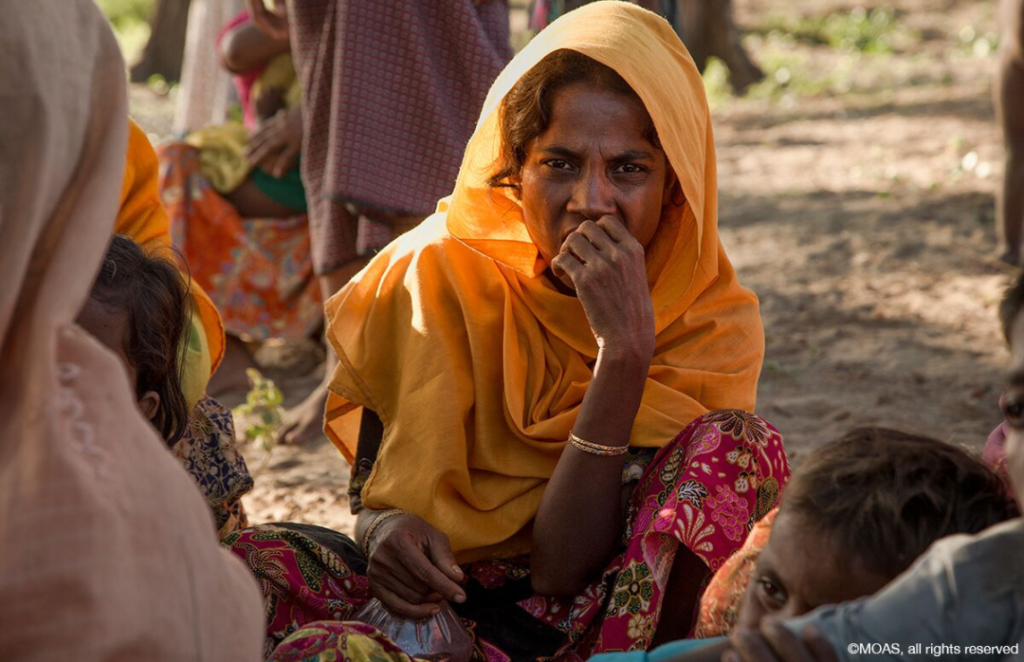Globally, one in three women has experienced sexual violence or violence committed by intimate partners at least once in their lifetime. Being a migrant accentuates the risks of women and girls to various forms of gender-based violence (GBV) in their countries of origin, transit countries, destination, and upon their return.
Overview
Gender-based violence is defined as any harmful act that is perpetrated against a person’s will and based on socially ascribed differences between women and men, rooted in gender inequalities. While migrating men and boys also experience gender-based violence, migrant women and girls continue to be disproportionately affected by all forms of violence due to their gender.
Along certain migration routes, the risk of violence against women is particularly high. In one study conducted with migrants who had travelled along the Mediterranean route from Northern Africa to Italy, it was estimated that 90 percent of the women and girls who participated in the study were raped at some point during their journeys.
Gender-Based Violence Throughout Migration
Violence can be both a driver as well as a risk of migration. The threat or experience of gender-based violence can be a reason for women and girls to migrate. In the Horn of Africa, for example, women and girls flee to escape gender-based violence and other harmful practices such as female genital mutilation and child marriage.
However, women’s decision to migrate also leads to increased risks of violence from guardians, intimate partners, or community members who disagree with their decision. Further, the journey they undertake exposes them to a range of risk factors for GBV.
Exposure to Perpetrators
Violence against migrant women happens at all stages of migration and is committed by a variety of actors, including smugglers, human traffickers, authorities like police and border guards, intimate partners, and other migrants. Smugglers are key perpetrators of violence against migrant women and girls worldwide. A survey revealed that along the East and Horn of Africa migration corridor, smugglers were responsible for 90 percent of incidents of gender-based violence. Smugglers charge exorbitant fees for migrants, resulting in debt bondages, increasing migrant women’s risk of forced labour and sexual exploitation.
Fear of Speaking Out
Migrant women are less likely to report cases of gender-based violence for fear of losing their job, partner, or residency status. Migrant women whose residency status is dependent on their partners are at high risk of intimate partner violence and domestic violence and do not report such incidences for fear of deportation.
How Women Are Responding
In response to these risks, some Eritrean women transiting through Libya on their way to southern Europe have taken extraordinary precautions, including traveling while pregnant or with younger children in an effort to prevent the risk of experiencing violence. Many married women migrating through North Africa do so separately from their husbands, because their husbands attempting to intervene during an assault could lead to tragedy.
What We Must Do
To tackle and prevent violence against migrant women, we must work to eliminate the risk factors along their journeys and ensure that health, justice, and social service providers are trained on the specific needs of migrant women.
Increasing routes for regular migration is essential. Safe and Legal Routes enable women and girls to migrate safely, ensuring better protection of their human rights and facilitating access to social protection and public services. Providing access to Safe and Regular migration pathways can also help eliminate the need for irregular migration, including the use of smugglers, and prevent exploitation while reducing exposure to gender-based violence, including trafficking in persons.
Final Thoughts
The plight of gender-based violence against migrant women is a pressing global issue that demands our attention and action. Migrant women and girls face heightened risks of violence at every stage of their journey. We must work together to increase risk awareness and train officials and service providers to support migrant women in a survivor-centred manner. This is a matter of human rights and a challenge we must confront as a global community.
If you are interested in the work of MOAS and our partners, please follow us on social media, sign up for our newsletter and share our content. You can also reach out to us at any time via [email protected]. If you want to support our operations, please give what you can at www.moas.eu/donate.


